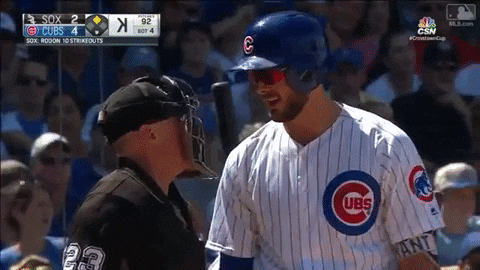
One of the more frequent mantras we've been seeing around social media the past year is that the Cubs should trade Kris Bryant. He's not clutch, they say. He hasn't put up MVP-level numbers, they say. He's an average offensive player, they say. This post is not to dispel any of that, even though none of it is factually true. If there is a reason to trade Bryant, it's because he becomes a free agent after the 2021 season and may not be interested in signing an extension with the Cubs--get value for him in a trade while he still has some pre-free agency time left on his deal. I am not advocating this, mind you... I am team #SaveSparkles. However, I can at least see the logic in this line of thought. It doesn't quell the calls to trade KB when the FO has made it clear that they will listen to offers on him this winter, and now a new wrinkle as possibly entered the equation--Bryant's service time grievance.

What is service time?
I'm glad you asked! Service time is the time a player spends on the active major league roster or injured list of the team he plays for. Each major league season consists of 187 days, and a player is deemed to have reached one year of service time when they spend 172 days on the roster in a given year. A player must accrue six full years of service time before they can become a free agent.
Kris Bryant was called up to the majors and placed on the Cubs roster on April 17, 2015--one day later than he would need to accrue a full year's worth of service time that season, and ensuring that the Cubs would retain his services an extra season before he could enter free agency.
(Matt barges in: Because he eventually fizzled out, people tend to forget the Cubs had just traded for Mike Olt. Olt was a big prospect at one point and supposedly just fixed a vision issue and hit .302./348./585 the previous year in AAA. It wasn't malicious wanting to get a look at Olt. As soon as Olt got hurt, KB was called up. There are clear cut cases of service time manipulation, but I don't see how it can be argued that the Cubs just did that. Oh, and yes I just Bert'd you!) KB isn't the only player to have this happen, as we've seen similar situations with George Springer, Bryce Harper, Ronald Acuña, Jr., and most recently Vladimir Guerrero, Jr., who were all held in the minors to probably do defensive work they didn't need so their teams could keep them around an extra year. After 2015, though, Bryant filed a grievance over the service time manipulation and four years later it was finally heard by an arbiter yesterday.
While we wait (MONTHS?!?) for a decision, we'll have plenty of time to stress out about what this could mean for Sparkles' future with the Cubs. If he wins, it means he's a free agent at the end of the coming season and could be attractive trade bait if the Cubs want to retool on the fly, even if they're contending. The problem with the potentially long decision process is the uncertainty it leaves the FO on their spending decisions. If you're Thed and you know Bryant only has one year left on the team, maybe you try a little harder to move him and spend your pennies on Anthony Rendon, especially if KB is dead set on testing free agency and not signing an extension. The calculus changes immensely if his contract suddenly becomes a one-year affair versus two, particularly since the free-agent class at 3B for 2021 is extremely sparse.
If Bryant wins, it also sets a huge precedent for other players that were victims of service time manipulation. Maybe we next see a similar grievance from Guerrero (the other players listed above have already signed contract extensions or have hit free agency), but at the very least this could be a game-changer and sticking point when the next MLB collective bargaining agreement is negotiated after the 2021 season. Stay tuned, and keep your fingers crossed this doesn't take months to resolve.